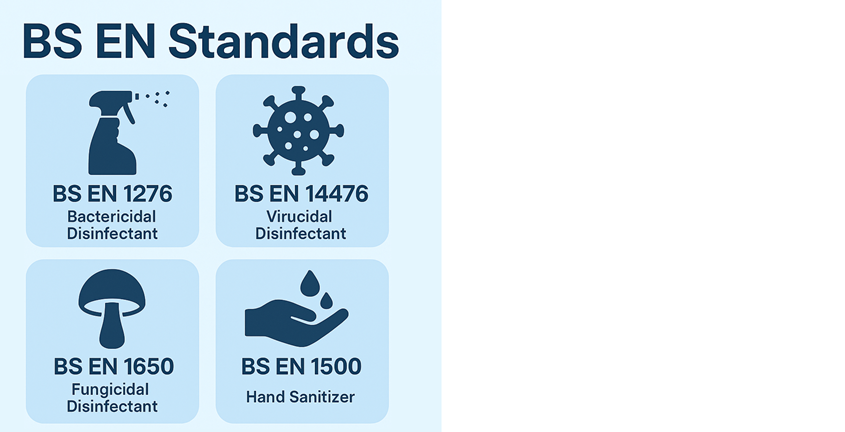Understanding BS EN Standards: A Deep Dive into 1276, 14476, 1650 & 1500

Let’s unpack the four most critical British and European Standards in the cleaning and hygiene industry: BS EN 1276, BS EN 14476, BS EN 1650, and BS EN 1500. Each one plays a unique role in ensuring that disinfectants and hand hygiene products are effective against specific types of microorganisms.
BS EN 1276 – The Bactericidal Benchmark
Purpose: BS EN 1276 is the gold standard for bactericidal activity. It ensures that chemical disinfectants and antiseptics are effective against harmful bacteria.
Scope of Application:
- Food preparation areas
- Industrial and domestic environments
- Institutional settings (e.g., schools, care homes)
Microorganisms Tested Against:
- MRSA
- Salmonella
- E. coli
- Pseudomonas aeruginosa
Testing Method:
- Quantitative suspension test
- Product must kill 99.999% of bacteria within 5 minutes under clean conditions
- Some Astral Hygiene products achieve this in just 30 seconds, making them ideal for fast-paced environments like commercial kitchens
Why It Matters: This standard is essential for preventing cross-contamination, especially in food handling. The Food Standards Agency recommends BS EN 1276-certified products to reduce the risk of E. coli outbreaks.
BS EN 14476 – The Virucidal Standard
Purpose: BS EN 14476 evaluates the virucidal activity of disinfectants. It’s crucial for environments where viral transmission is a concern.
Scope of Application:
- Medical and healthcare settings
- Public transport
- Offices and communal areas
- Domestic environments during viral outbreaks
Viruses Tested Against:
- Norovirus
- Influenza
- Adenovirus
- Poliovirus
Testing Method:
- Phase 2, Step 1 quantitative suspension test
- Product must demonstrate efficacy against specified viruses within a defined contact time3
Why It Matters: During viral outbreaks (like COVID-19), BS EN 14476-certified products offer assurance that surfaces are being properly disinfected. This standard is often paired with BS EN 1276 to ensure both bacterial and viral protection.
BS EN 1650 – The Fungicidal & Yeasticidal Standard
Purpose: BS EN 1650 focuses on the fungicidal and yeasticidal activity of disinfectants, ensuring they are effective against fungi and yeasts.
Scope of Application:
- Food industry
- Healthcare
- Cosmetic manufacturing
- Domestic cleaning
Microorganisms Tested Against:
- Candida albicans
- Aspergillus niger
Testing Method:
- Quantitative suspension test
- Product must reduce fungal and yeast populations to acceptable levels within a specified time
Why It Matters: Fungal contamination can be persistent and difficult to eliminate. BS EN 1650 ensures that disinfectants are capable of tackling these threats, especially in damp or organic-rich environments.
Purpose: BS EN 1500 sets the benchmark for hand rubs and hand sanitisers, ensuring they are effective in reducing transient flora on hands.
Scope of Application:
- Healthcare professionals
- Food handlers
- General public during outbreaks
Testing Method:
- Simulated hand hygiene test
- Volunteers apply the product and compare its efficacy to a reference alcohol-based hand rub
- Must achieve a statistically significant reduction in microbial load
Why It Matters: Unlike surface disinfectants, BS EN 1500 is all about human application. It ensures that hand sanitisers are not just convenient but scientifically proven to reduce the spread of pathogens.
Summary Table: Quick Comparison
|
Standard |
Target Microorganisms |
Application Area |
Key Requirement |
|
Bacteria |
Food, industrial, domestic |
99.999% kill rate within 5 minutes |
|
|
Viruses |
Medical, public, domestic |
Proven efficacy against specific viruses |
|
|
BS EN 1650 |
Fungi & Yeasts |
Food, healthcare, cosmetic |
Effective reduction of fungal organisms |
|
BS EN 1500 |
Transient hand flora |
Human skin (hands) |
Comparable to reference hand rub |
Why These Standards Matter for Astral Hygiene Customers
At Astral Hygiene, we don’t just sell cleaning products—we sell confidence. When you choose a disinfectant or sanitiser that meets these standards, you’re choosing:
- Proven efficacy
- Regulatory compliance
- Protection for staff, customers, and the public
- Peace of mind during audits and inspections
Whether you're running a commercial kitchen, managing a care facility, or simply maintaining a clean home, understanding these standards helps you make informed decisions that protect health and uphold hygiene excellence.
Shop Certified Products
Looking for BS EN 1276 or BS EN 14476 certified products? Browse our Astral Hygiene product range to find fast-acting, compliant solutions that meet your needs.
Great question! These BS EN standards aren’t just technical jargon—they’re the backbone of real-world hygiene practices across industries. Here’s a breakdown of how each standard is applied in practical settings:








